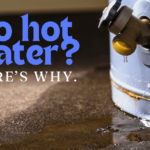Why Residential Hot Water Heaters Break Down and How to Maintain Them
Hey there, homeowners! As a professional commercial plumber, I’ve seen my fair share of hot water heater issues. These trusty appliances are the unsung heroes of our homes, providing hot water for showers, dishwashing, laundry, and more. But like any hardworking machine, they can break down if not properly maintained. In this blog post, I’ll explain why residential hot water heaters break down and share some essential maintenance tips to keep them running smoothly.
Common Reasons Why Hot Water Heaters Break Down
- Sediment Buildup
Over time, minerals from your water supply can settle at the bottom of your water heater tank. This sediment buildup can reduce the efficiency of your heater and cause it to overheat, leading to potential damage. If you hear a rumbling or popping noise, it’s a sign that sediment has accumulated and needs to be flushed out. - Corrosion
Water heaters are prone to rust and corrosion, especially if the anode rod is not replaced regularly. The anode rod is a sacrificial component that attracts corrosive elements, preventing them from damaging the tank. If the rod is completely corroded, the tank itself will start to rust, leading to leaks and eventual failure. - Faulty Thermostat
The thermostat controls the temperature of the water in the tank. If it malfunctions, it can cause the water to be too hot or not hot enough. In some cases, a faulty thermostat can cause the heating elements to overwork, leading to premature failure1315. - Pressure Issues
The temperature and pressure relief (TPR) valve is a critical safety feature that releases excess pressure from the tank. If this valve is faulty or if the pressure inside the tank gets too high, it can cause leaks or even a tank explosion. Regularly testing the TPR valve is essential to ensure it functions correctly. - Old Age
Most water heaters have a lifespan of 10-15 years. As they age, the components wear out, and the efficiency decreases. If your water heater is nearing the end of its lifespan, it might be time to consider a replacement to avoid unexpected breakdowns.
Essential Maintenance Tips to Keep Your Water Heater in Peak Condition
- Flush the Tank Annually
Flushing your water heater tank once a year helps remove sediment buildup, improving efficiency and extending the life of the unit. To do this, turn off the power or gas supply, attach a hose to the drain valve, and let the water drain out until it runs clear. Refill the tank and turn the power or gas back on. - Check and Replace the Anode Rod
The anode rod should be checked every 1-2 years and replaced if it is more than 50% corroded. To check the rod, turn off the power or gas supply, drain a few gallons of water from the tank, and unscrew the rod from the top of the tank. If it’s heavily corroded, replace it with a new one. - Test the TPR Valve
The TPR valve should be tested every six months to ensure it functions correctly. To test it, lift the lever on the valve and let some water out. If water continues to flow after you release the lever, the valve needs to be replaced. - Adjust the Temperature
Setting your water heater’s thermostat to 120 degrees Fahrenheit can help prevent scalding, reduce energy consumption, and slow down mineral buildup. Use a flathead screwdriver to adjust the temperature on the thermostat. - Insulate the Tank and Pipes
Insulating your water heater tank and the first few feet of hot and cold water pipes can reduce heat loss and improve efficiency. You can purchase insulation blankets and foam pipe insulation from your local hardware store. Be sure not to cover the thermostat or the top and bottom of the tank. - Inspect for Leaks and Corrosion
Regularly inspect your water heater for any signs of leaks, rust, or corrosion. Check the area around the tank, the connections, and the pipes. If you notice any issues, address them promptly to prevent further damage. - Get a Professional Inspection
While you can perform many maintenance tasks yourself, it’s a good idea to have a professional plumber inspect your water heater annually. They can identify potential issues that you might miss and ensure that your unit is operating efficiently and safely.
Signs That Your Water Heater Needs Professional Attention
- Inconsistent Water Temperature
If your water heater is not providing consistent hot water, it could be due to a faulty thermostat, heating element, or sediment buildup. A professional can diagnose and fix the issue1314. - Strange Noises
Rumbling, popping, or banging noises from your water heater are signs of sediment buildup or other internal issues. Flushing the tank might help, but if the noise persists, it’s time to call a professional. - Leaks
Any sign of water leaking from your water heater should be addressed immediately. Leaks can cause significant damage to your home and indicate a serious problem with the tank or connections. - Rusty Water
If the hot water from your taps is rusty, it could be a sign that the anode rod is corroded, or the tank itself is rusting. Replacing the anode rod might help, but if the tank is rusting, it may need to be replaced. - Age of the Unit
If your water heater is over 10-15 years old and experiencing frequent issues, it might be more cost-effective to replace it with a new, energy-efficient model.
Conclusion
Maintaining your water heater is essential to ensure it operates efficiently and lasts as long as possible. By following these maintenance tips and being vigilant for signs of trouble, you can avoid unexpected breakdowns and costly repairs. Remember, while some tasks can be done yourself, it’s always a good idea to have a professional plumber inspect your water heater annually. If you have any questions or need assistance with your water heater, don’t hesitate to reach out to a trusted plumbing professional. Happy maintaining! By following these tips and understanding the common reasons why water heaters break down, you can keep your unit in peak condition and enjoy reliable hot water for years to come. If you have any questions or need professional assistance, feel free to reach out to your local plumber. We’re here to help!






